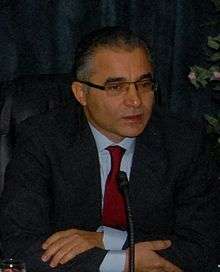Mohsen Marzouk
| Mohsen Marzouk | |
|---|---|
| محسن مرزوق | |
 | |
| Personal details | |
| Born |
July 1965 Sfax, Tunisia |
| Nationality | Tunisian |
| Political party | Nidaa Tounes |
Mohsen Marzouk (Arabic: محسن مرزوق; born in July 1965) is a Tunisian politician. He holds a degree in Political sociology and International Relations from the International Studies Association in Tunis.
Early life
Mohsen Marzouk was born in July 1965 and raised in a poor working-class neighborhood in the city of Sfax. At fourteen, he was expelled from his school for his oppositional political activities. He however managed to reenter and finish high school in Sfax.[1]
At the University of Tunis Marzouk was a leading student activist. In 1987, while still enrolled, he was arrested by Tunisia's secret police. He was interrogated and tortured for many days before being sent to a labor camp in the southern desert of Tunisia.[1]
When he was allowed to return, Marzouk remained politically active. He worked towards reinstating the General Union of Tunisian Students (UGET)[1] which after Ben Ali's rise to power became deeply divided over its further political course.[2] Marzouk was appointed to the UGET's executive bureau[1] while at the same time, he was conspiratively active for the outlawed leftist movement El Amal Ettounsi.[3]
Career
From 1989 on, he worked as a coordinator for the newly founded Arab Institute for Human Rights.[4] Since 2008 he has been secretary-general of the non-governmental Arab Democracy Foundation and member of the International Steering Committee of the Community of Democracies.[5]
Marzouk is one of the founders of Nidaa Tounes and member of the party's Executive Committee.[4] As Beji Caid Essebsi's campaign manager in the 2014 presidential election[6] he announced Essebsi's victory in the runoff vote on 21 December,[7] stating that Tunisians were now turning the page of the transitional phase[8] and that Tunisia was now a stable democracy.[9] Marzouk’s faction within Nidaa Tounes supports a more assertive, secularist government.[10]
Publications and working papers
- Marzouk, M. (1997): The Associative Phenomenon in the Arab World: engine of democratisation or witness to the crisis? in: David Hulme and Michael Edwards (ed.): "NGOs, States and Donors. Too close for comfort?" New York: St. Martin's Press, 1997. Republished: London: Palgrave Macmillan, 2013, ISBN 9781137355140.
- Marzouk, M. (2003): Social Movements in Tunisia: Searching for the Absent. Arab Research Center, 2003.
- Marzouk, M. (2005): Social Movements in Tunisia and the Democratization Process. Santiago: Community of Democracies, 2005. (archived)
References
- 1 2 3 4 Carpenter, Scott (2008). "Dissident Watch: Mohsen Marzouk". Middle East Quarterly. 15 (3).
- ↑ Immigration and Refugee Board of Canada (2005-11-01). "Tunisia: The General Union of Tunisian Students (l'Union générale des étudiants Tunisiens, UGET) (2003-2005)". Retrieved 2014-12-23.
- ↑ Tavana, Daniel; Russell, Alex (October 2014). "Previewing Tunisia's Parliamentary & Presidential Elections" (PDF). Project on Middle East Democracy. p. 9. Retrieved 2014-12-23.
- 1 2 وجه من المشهد السياسي: محسن مرزوق… [The face of the political scene: Mohsen Marzouk] (in Arabic). 2014-08-09. Retrieved 2014-12-22.
- ↑ "Mohsen Marzouk, Tunisia". Council for a Community of Democracies. Retrieved 2014-12-22.
- ↑ "Tunisians vote for first freely elected president of post-Ben Ali era". Reuters. 2014-11-23. Retrieved 2014-12-23.
- ↑ "Tunis : « Bajbouj Président », a annoncé Mohsen Marzouk aux partisans de BCE". African Manager (in French). 2014-12-21. Retrieved 2014-12-23.
- ↑ "Présidentielle : Mohsen Marzouk annonce la victoire de Caïd Essebsi". Kapitalis (in French). 2014-12-21. Retrieved 2014-12-23.
- ↑ "Tunisie : La campagne de BCE proclame la victoire, Manser conteste". gnet.tn (in French). 2014-12-21. Retrieved 2014-12-23.
- ↑ "A rift in the ruling party may be the least of Tunisia's problems". The Economist. 17 November 2015. Retrieved 18 November 2015.